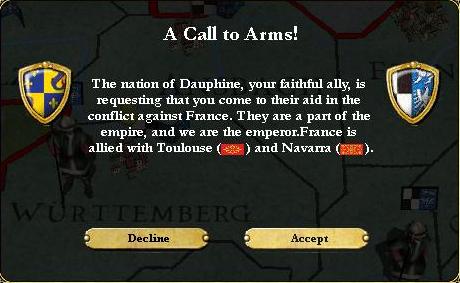Part 32: Europa Universalis III: Chapter 2 - War of the Golden Bull: 1400 - 1402
1400 - 1402: War of the Golden Bull
The Grand Duchy of Swabia, Anno Domini 1400.

In addition to his traditional holdings of Swabia and Bavaria, Waldemar is also the current ruler of the Imperial Demesne, consisting of the provinces of Mainz, Pfalz and Ansbach. Though effectively a part of Swabia at the moment, they will cease to be so the moment that the Hohenzollerns lose the crown.

The debate and voting over the three Imperial Propositions presented on the first reichstag finally ends on January 2nd with a resounding victory for Waldemar's own Imperial Culture and Dignity Act.
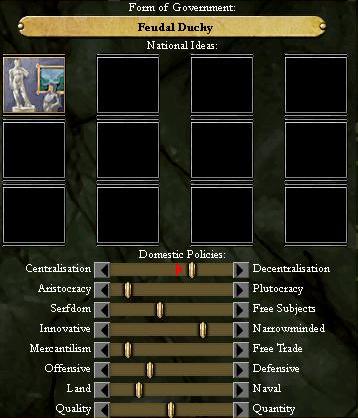
Highly pleased with the results of the Reichstag, Waldemar returns to Württemberg and begins to prepare for the invasion of the Papal State, ordering the levying of additional war taxes to pay for the whole affair.
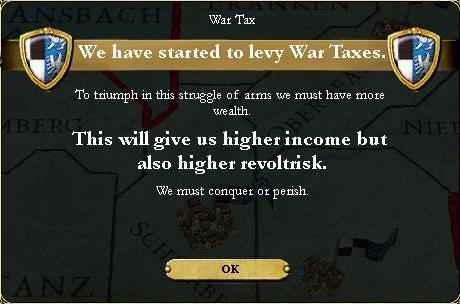
He also takes some time to send out diplomatic envoys and put Swabia's affairs in order before setting out. A trade agreement is signed with Venice to give Swabia's merchants a better chance at competing in its markets, an embassy is established in Oberpfalz to foster closer relations with the Elector of Sudety, and military alliances are signed with the Duchies of Tirol, Alsace and Saxony.
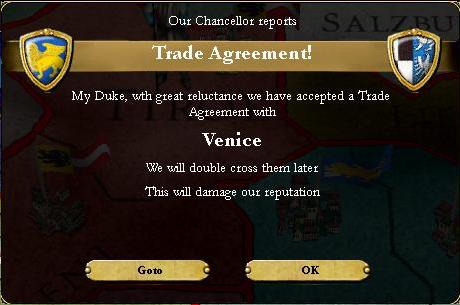
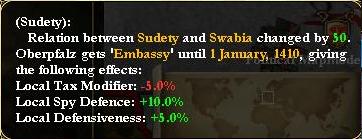
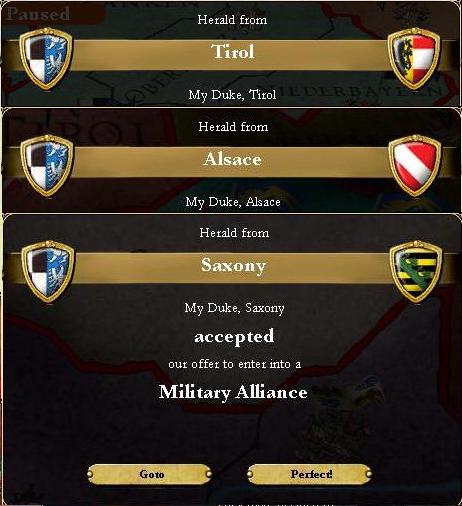
Some important news also have time to reach Württemberg: With his new semi-independent status, the Grand Duke of Austria has decided that being Grand Duke is not enough, and has proclaimed himself King of Austria, though he sends assurances to Waldemar that he still recognizes the sovereignty of the Emperor and has no plans to secede. Placated, Waldemar lets the matter slide.
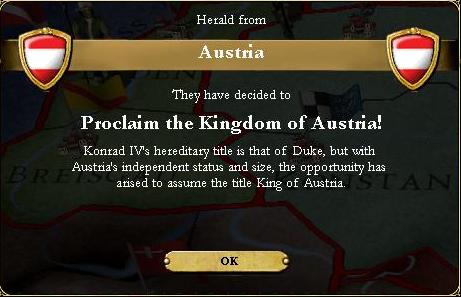
Furthermore, Sweden has formalized its status as a pan-scandinavian union and proclaimed the Kingdom of Scandinavia.
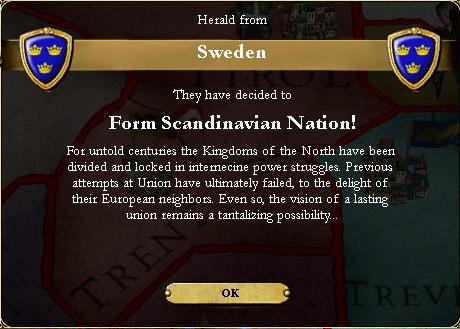
The 16,000 strong Imperial Army finally leaves Swabia in February, heading south through Tirol towards Italy.

Waldemar discovers that while he was occupied at home, Pope Bonifacius IX has not been idle, marching up to meet the Emperor on the field at the head of a 14,000 man strong army. The two armies meet in Verona, and though his army suffers the greatest number of the casualties, Waldemar emerges the victor, as the Papal army retreats in good order.


The scene continues to repeat itself through North Italy for several months as the Papal Army retreats time and again, bleeding Waldemar in skirmishes and letting attrition do the rest of the job. The Pope proves to be a superb cavalry commander, and though Waldemar wins every battle, his supply lines are stretched thin and reinforcements are only coming in at a slow trickle.

Then, in a stroke of good fortune for Waldemar, Bonifacius IX is killed in battle outside Modena. Without their general, his army quickly routs, fleeing back to Rome, with Waldemar in pursuit. Bonifacius IX's successor, Bonifacius X, rallies his forces and makes a stand, but he is nowhere near the military commander that his predecessor was, and once again the Papal Army is routed.
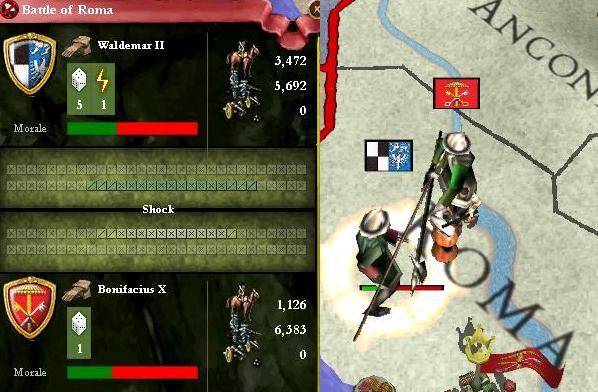
A small force is left behind to siege Rome while Waldemar pursues the Papal Army throughout Italy, hoping for an opportunity to entrap or surround it. The opportunity, however, fails to present itself, as Waldemar's remaining forces prove to be too few to score a decisive victory. After over a year of chasing the the new Pontiff up and down Italy, Rome finally falls.
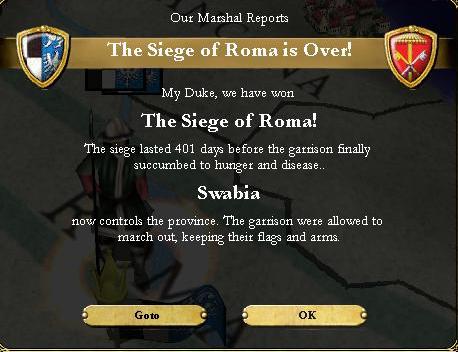
Though the capture of Rome is cause for celebration for Waldemar, there is trouble back home. A year and a half of war taxes and attrition has caused the normal grumbling and discontent to bubble over into open revolt, An army of rebellious peasants has laid siege to Württemberg itself, and more revolts threaten to break out.

Lacking the manpower to both conquer the Papal States and put down the revolts back home, Waldemar settles for the best peace deal he can squeeze out of the Pope, forcing the Pontiff to relinquish control over the Southern Italian minors and pay a moderate sum of gold in tribute.
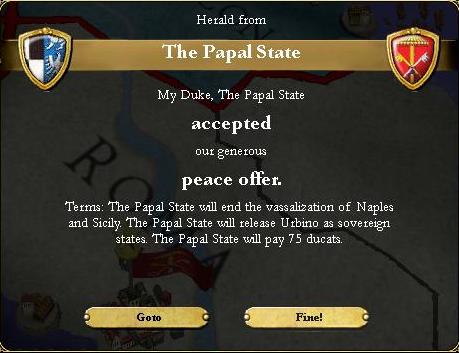
He then quickly rushes home and arrives in time to save Württemberg and put down the revolt.
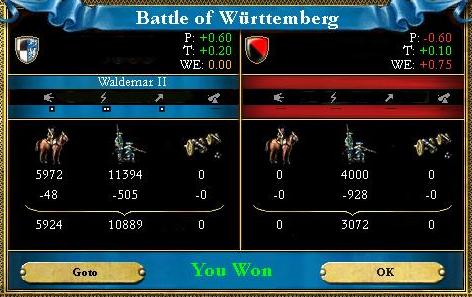
While Waldemar was trudging back and forth through Italy, trouble has arisen in Northeastern Germany. The Poland-Lithuania alliance has subjugated Mazovia and invaded Silesia, and Brandenburg and Austria have used the ensuing chaos to attack Silesia's ally, the Grand Duchy of Meissen.
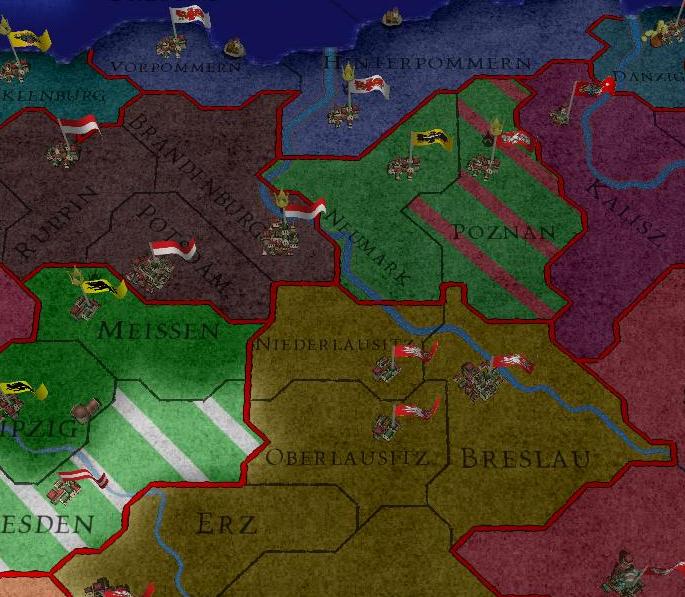
However, before Waldemar even has a chance to see over his own lands, let alone worry about Meissen's troubles, dire news arrive at the court...
France has invaded.
